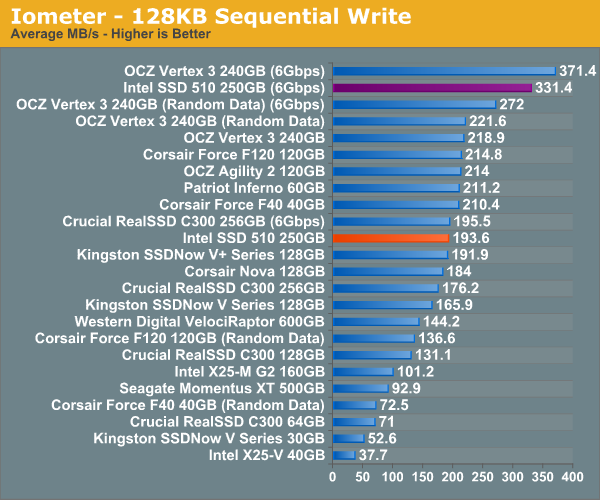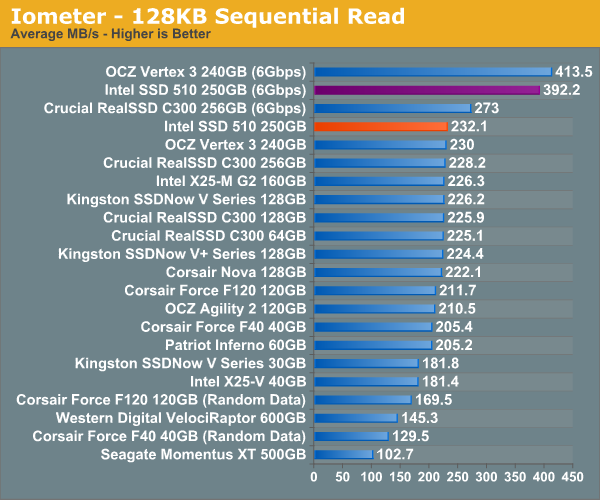The Intel SSD 510 Review
by Anand Lal Shimpi on March 2, 2011 1:23 AM EST- Posted in
- IT Computing
- Storage
- SSDs
- Intel
- Intel SSD 510
Sequential Read/Write Speed
To measure sequential performance I ran a 1 minute long 128KB sequential test over the entire span of the drive at a queue depth of 1. The results reported are in average MB/s over the entire test length.

Sequential performance is another story entirely. When paired with a good 6Gbps SATA controller (in this case the H67's 6Gbps Port 1), the 510 is only 11% slower than the best case performance of the Vertex 3. Compared to the worst case performance for the Vertex 3, Intel's SSD 510 is 22% faster.
The comparison isn't as strong over a 3Gbps interface. Bound by the SATA interface, OCZ's Vertex 3's worst case performance is actually no different than its best case performance in 3Gbps mode. As a result, the Vertex 3 is consistently 13% faster than the Intel SSD 510.

While the 510 isn't remotely competitive in random read performance, sequential read speed is within 5% of the OCZ Vertex 3 - without any real time compression/dedupe trickery. And over a 3Gbps interface the Intel SSD 510 equals OCZ's Vertex 3.










128 Comments
View All Comments
Squuiid - Friday, March 4, 2011 - link
+1They were the 1st of this next gen to be available, yet NOBODY has reviewed them.
Based on the 2nd Gen Marvel controller I believe, a' la C400.
Luke212 - Friday, March 4, 2011 - link
Anand,I am looking to implement SSDs in Application servers and I need to know how they go in Raid 1 over time. Noone seems to test this! So I am stuck with magnetic drives!!
sean.crees - Friday, March 11, 2011 - link
Anyone else notice the Samsung 470 near or at the top of most benchmarks on a 3gb controller? Is this the SSD in current Macbook Pro's? I havn't seen a review posted to Anandtech about this specific device.daidaloss - Tuesday, March 15, 2011 - link
I'm curious as to how does this SSD drive stacks up when compared to this unit SATA2 DDR2 HyperDrive5 from http://www.hyperossystems.co.uk/.Maybe sometime in the future, Anand will consider this RAM drive.
tygrus - Wednesday, May 11, 2011 - link
Not specific to Intel 510 SSD:Sequential performance after several full disk GB rewrites ?
The LBA remapping for wear levelling must make more of the disk look random (not sequential) after every block has been re-written several times. It's a torture test to see how it can handle reading large files that have been spread over several non-sequential NAND blocks. Or does it not matter as much because the controller can optimise access to several NAND dies at once? Does it only remap 512KB at a time or does the 512KB blocks have non-sequential 4KB LBA's written to them?
Does SSD performance approach random R/W performance after long term heavy use ?
gaffe - Tuesday, October 11, 2011 - link
Just an anonymous tip. I happen to know this data is wildly inaccurate because my friend is a reliability engineer at a major company.WHY DON'T YOU DO A SMALL RELIABILITY TEST OF YOUR OWN TO SEE FOR YOURSELF HOW UNLIKELY IT IS THAT THIS DATA IS ACCURATE.
It seems you have tested probably 20 SSDs for your reviews. So, how many of them have failed on you during testing? How many during the course of the past 3 years? What's the failure rate average across all manufacturers?
Even though manufacturers probably send you their best tested units for review, and your sample size is small, etc. I am willing to bet you REAL MONEY that the failure rate will be more than 3% even in a sample size of just 20.
How about we buy 20 SSDs today and in 3 years see who is right, loser buys em all, winner gets em (you can keep the failed ones)?
Any takers?
gaffe - Tuesday, October 11, 2011 - link
Oh and P.S.You forgot to mention above that failure rates are generally PER YEAR. So that's a 3% chance it fails EACH YEAR. And it's still wrong by double or triple (it's closer to 9%).
gaffe - Tuesday, October 11, 2011 - link
Sorry to keep piling on, but it bothers me so much that this inaccurate data is out there and people are believing this that I also want to mention this data does not even say which models were tested. This is probably all enterprise grade drives that does not even apply to consumers that are reading this article, and, as I said above, it's STILL INACCURATE!